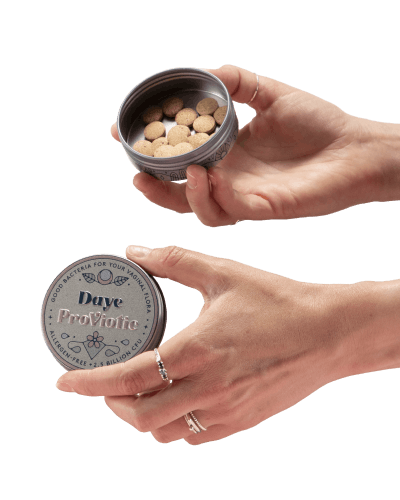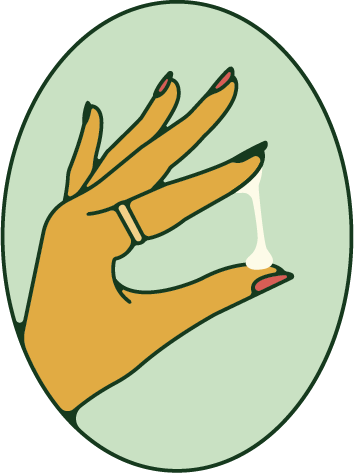Written by Liv Cassano
Illustrated by Erin Rommel
From periods and sex to childbirth and menopause, the vagina definitely goes through a lot. Luckily, the vagina is one of those body parts that is typically happiest when you leave it alone.
It’s understandable if you feel the need to wash it. After all, we wash our bodies, our faces and our hair –why not wash the vagina, too? We are socially conditioned to think vaginas are dirty and high-maintenance, which is probably why “vaginal spas” have become a thing. That couldn’t be further from the truth.
Boost your vaginal and gut microbiomes
Daye's lactobacilli supplement enables you to look after your microbiome.

Should I wash my vagina?
The vaginal canal is lined with mucous membrane and a cocktail of different bacteria (known as the vaginal microbiome) that are both responsible for protecting the vagina from infections. Lactobacilli, the “good” bacteria in your vaginal microbiome, maintain an ideal (slightly acidic) pH balance that keep the “bad” bacteria out. As if that’s not impressive enough, the vagina is a self-cleaning organ that washes itself by producing secretions (AKA your discharge).

Why you should avoid vaginal washes & related products
There’s a range of products available that claim to “clean”, “freshen” and “balance” your vagina, making up the multi-billion industry of personal hygiene. Truth is, these sorts of claims are completely unfounded, steeped in misogyny (why are there no “penile hygiene” products?) and often risk doing more harm than good.
You needn’t look any further than your local pharmacy or supermarket to find products that claim to clean your vagina. Vaginal washes, wipes, deodorants and douches are not only unnecessary, but may increase your risk of infections.
Vaginal douching is the worst offender. It involves squirting a solution (often scented with synthetic chemicals) up your vagina with the intention of cleaning it. Not only will this not work, but it will wash out all the good, infection-fighting bacteria in your vaginal microbiome. Douching can put you at risk of vaginal infections such as thrush and BV, as well as HPV.
It may sound counterintuitive, but washing your vagina actually hinders its ability to clean itself.
The risks of vaginal steaming
Take vaginal steaming, for example. Although it can be traced back centuries to ancient Asian and African holistic medicine, it became mainstream thanks to Gwyneth Paltrow.
The process involves squatting over herb-infused steaming hot water, which supposedly “cleans” the vagina and the entire reproductive tract. There’s absolutely no scientific evidence to back up any of the purported benefits of vaginal steaming, in fact, experts agree that it’s actually harmful (and propagates negative self-image).
Aside from the risk of burning your genitals, exposing your vulva and vagina to high humidity and warmth creates the perfect breeding ground for bad bacteria, which can lead to vaginal infections.
What should I do about vaginal odour?
It’s normal for your vagina to have an odour, and the smell is not only completely unique, but also changes depending where you are in your menstrual cycle. Your vagina’s bacterial makeup changes in response to pH and hormones, affecting the way you smell.
It’s common for your vaginal to smell stronger while you’re ovulating (when your body produces more cervical mucus) Certain types of contraceptive methods, such as the combined contraceptive pill, may also affect vaginal smell.
Another culprit? Semen has an alkaline pH, so if it comes into contact with the vagina, it can change its scent. And of course, sweat can also make things more ~pungent~. Your groin contains sweat glands, so much like your armpits would smell after a long day or intense workout, so will your crotch.
Vaginas are not meant to smell like rose gardens, and it’s completely ok for your vagina to smell like a vagina! Although there are a range of products – from sprays to scented tampons – meant to make your vag smell “fresh,” there is really no need for them. Fragrances can disrupt your vaginal microbiome and actually cause your vagina to smell worse than it did before.
As long as you don’t have an infection, the way your vagina smells is absolutely fine! However, if that smell becomes foul or fishy, it may indicate that you have BV.
What is normal vaginal discharge?
Normal vaginal discharge ranges from yellowish to clear in colour, and thick to slippery in consistency. The consistency, quantity and colour of your discharge can change throughout your menstrual cycle in response to hormonal fluctuations.
Everyone is different, the key is knowing what is normal for your body.

How to practice good vaginal and vulva hygiene
While we’ve established that you don’t need to clean your vagina (you really don’t), you do need to wash your vulva.
Your vulva doesn’t have the same self-cleaning functions your vagina is blessed with, so it needs a little extra help. Even so, there’s no need for soap or special washes, so warm water alone will do. If you chose to use soap, opt for an unscented, pH-balanced option.

A good way to take care of your vaginal health is to take probiotics. Daye's ProViotics contain 2.5 billion live cells of Lactobacillus plantarum GLP3 which will help protect your vagina from infections like thrush and BV.

Generally speaking, maintaining good vaginal health means taking care of overall health, but there are some extra precautions you can take:
Pay attention to ingredients
If you’re putting anything inside your vagina, pay attention to the ingredients. Scented tampons, condoms and lube should be avoided, and always make sure to use toys that are made from body-safe materials (like food-grade silicone).
As for tampons, Daye’s organic, sanitised, clinically-tested tampons with their protective sleeves are the safest option (but I guess we’re biased).
Change your tampons regularly
Make sure to change your tampon every 4 hours. Not only does this cut down on bacterial breeding, but it also reduces the risk of toxic shock syndrome (TSS).
Wipe Correctly
Always wipe front to back after going to the bathroom!
Practise good sexual habits
Nothing that goes near your anus should come into contact with your vagina. Toys, fingers and penises should be washed after anal play before being inserted in the vagina, and condoms should be changed when switching from anal to vaginal intercourse.
Speaking of intercourse, remember to pee after sex to prevent UTIs.
Switch to a gentle laundry soap
When it comes to washing your pants, it’s a great idea to use a gentle laundry detergent that’s formulated for sensitive skin.
Change out of your gym clothes
Avoid wearing sweaty gym clothes for too long. Damp and warm conditions are an ideal breeding ground for bacteria, especially when sweat is involved.
Visit your doctor regularly
Get regular STI check-ups (every time you change sexual partner, or once a year if you’re in a committed relationship) and cervical screenings. We know they’re not the most fun thing to do, but it’s vital for your vaginal health!
TL;DR
- The vagina is a self-cleaning organ that doesn’t need any internal washing, steaming or douching.
- To wash your vulva, all you need is warm water.
- Vaginal washes, soaps, wipes and deodorants can weaken your vaginal microbiome and put you at risk of infections.
- To take care of your sexual health, always practise safe sex.






